Saskatchewan Health Authority (SHA) says the decision to have a series of mobile sites in Prince Albert was to provide additional access to novel coronavirus testing.

Seventy-five people were tested at a mobile location in the city on Tuesday, according to a statement from SHA.
“This is among a series of mobile testing locations in the area since July … this included resort communities in the summer months, and now in Prince Albert to increase access,” read the statement.
“Decisions about testing approaches are based on local demand and the SHA efforts to optimize access. There have been other locations where testing has been implemented to address increased case numbers, such as communal living settings, or in the northwest where teams went door-to-door in a number of communities.”
SHA said these sites are not ongoing like the two drive-thru testing locations that launched in Saskatoon and Regina earlier this month; however, mobile clinics also require no referral or appointment. People are required to bring their head card to both.

Get weekly health news
The next mobile sites currently scheduled to take place in Prince Albert are as follows:
- Safeway parking lot on Sept. 30;
- Leon’s Furniture on Oct. 7; and
- Location not available for Oct. 15.
SHA said it will continue to monitor testing demand to determine if additional clinics are required.
According to the provincial government, 1,507 COVID-19 tests were performed on Tuesday in Saskatchewan. To date, over 176,912 tests have been carried out in the province.
As of Wednesday, there were no active cases in the north-central zone, which is where Prince Albert is located.

Questions about COVID-19? Here are some things you need to know:
Symptoms can include fever, cough and difficulty breathing — very similar to a cold or flu. Some people can develop a more severe illness. People most at risk of this include older adults and people with severe chronic medical conditions like heart, lung or kidney disease. If you develop symptoms, contact public health authorities.
To prevent the virus from spreading, experts recommend frequent handwashing and coughing into your sleeve. They also recommend minimizing contact with others, staying home as much as possible and maintaining a distance of two metres from other people if you go out. In situations where you can’t keep a safe distance from others, public health officials recommend the use of a non-medical face mask or covering to prevent spreading the respiratory droplets that can carry the virus. In some provinces and municipalities across the country, masks or face coverings are now mandatory in indoor public spaces.
For full COVID-19 coverage from Global News, click here.



Comments